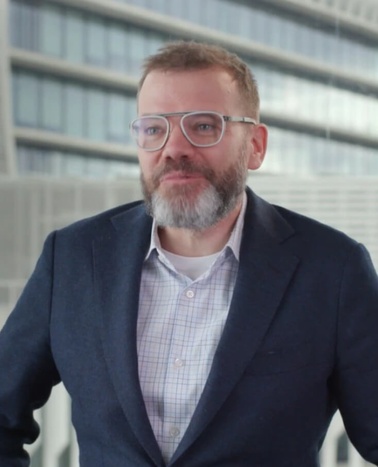
Alejandro Neut
I’m Alejandro Neut and I’m the lead economist of the digital economy unit at BBVA Research in Madrid, where I’ve led different units and projects for the past eight years. My current team coordinates research on the impacts of digitization across economies, industries and markets. Passionate about sharing well-established knowledge and debating new ideas, adding academia to my repertoire was the logical next step in my professional path. I look forward to working with graduate students, hearing their opinions and helping them make a positive impact using economics.
“Given IE University’s rankings, I am quite confident in my graduate students’ potential and skills.”
The evolving language of economics
As an intrinsic learner, Alejandro has always been motivated by debates and academic conversations. Throughout his professional journey, he sought fresh insights and was inspired to take his passion for conversation and learning and use it at a professional level as a university professor.
Previously studying at Science Po in Paris, Universidad de Chile in Santiago, as well as MIT and Harvard in Boston, Alejandro has always thrived in academia. Throughout his training, he found it extremely rewarding to discuss economic phenomena with intelligent, motivated and open-minded people. In his opinion, graduate programs in particular are where both students and faculty embrace this attitude.
Now working as an economics professor at IE University, Alejandro has the chance to openly discuss varying macro-financial perspectives with his students, helping them prepare for their future careers. Attuned to current events, he combines academic knowledge with relevant real-world questions that market analysts, think tanks and policymakers alike are addressing.
Alejandro believes that the Master in Applied Economics can help combat some of today’s most pressing societal issues, including COVID-19 recovery, inflation, deglobalization, as well as new industrial policy. So far in his professional journey, he says that trained economists often have a more holistic and structured approach to solving such global challenges.
“Corporations need to set short-term objectives but remain anchored to long-term goals; collecting the right data and knowing how to process it remains critical components in reacting effectively to unexpected events without losing sight of broader trends.”
The knowledge, openness and clarity gained from studying economics is fundamental in supporting the next generation of decision-makers, says Alejandro. Along those lines, he stresses the need for students to understand that economic modeling is an evolving language, not static or permanent.
At the center of this emerging language is the innovative and productive digital economy that has endured sustained economic growth. Yet at the same time, the new sector is a complex phenomenon without any real precedents, meaning there’s no guarantee that it’ll follow past trends. Government, technology and how nations embrace digitization will determine the future outcomes of the digital economy.
During this transformative time period, data-driven analysis is what Alejandro considers to be essential for companies to achieve goals. As far as corporate decision-making goes, robust data analysis involves setting short-term objectives while staying focused on long-term visions.
For Alejandro, this means collecting the right data while knowing how to process it. When used correctly by companies, data becomes a critical component in terms of reacting to unexpected events while remaining attentive to the broader trends at play.
Alejandro is looking forward to teaching at IE University. The fact that it ranks among top universities gives Alejandro an added confidence in the abilities of his future students.
- “Given IE University’s rankings, I am quite confident in my graduate students’ potential and skills.”